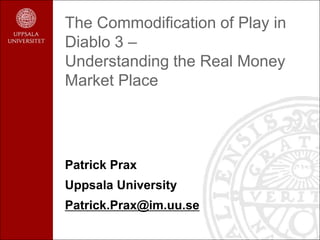The Commodification of Play in Diablo 3 – Understanding the Real Money Market Place - Patrick Prax
- 1. The Commodification of Play in Diablo 3 – Understanding the Real Money Market Place Patrick Prax Uppsala University Patrick.Prax@im.uu.se
- 2. •Diablo 3 and the real-money auction house (RMAH) •Prosumption, produsage and playbour •The RMAH and •Real-money trade •Game business models •Game design •Game Design as Marketing •Cases patrick.prax@im.uu.se 2
- 4. The Real-Money Market Place • Load your Battle.net account with money • Buy or sell virtual items for real money • Buy Blizzard products, games, merchandise, DLC, from that money • There is a fee for trading (1$ or 15%) and cashing out (15%) patrick.prax@im.uu.se 4
- 6. It has to make money • Blizzard forces people online – excluding many (>100 000 according to Extra Creditz) from playing - reducing sales – Accepting rubber-banding and other performance problems (like servers braking down at launch) patrick.prax@im.uu.se 6
- 7. Prosumption, Produsage and Playbour • Production and Consumption/Use at the same time – Facebook and other social media, In MMOs happening during normal play • Play and labor – Grinding, Farming, unpleasant mechanical play to gain an advantage • Do not really fit… patrick.prax@im.uu.se 7
- 8. Commodification of Play • Commodification of leisure • Work logic permeating the game, play, and the emerging social interactions • Breaking immersion and any residue of a magic circle • No equal start, not different place patrick.prax@im.uu.se 8
- 9. Real-Money Trade • Normally outside of the game • In Everquest included after launch • The RMAH is a RMT platform with a tax. patrick.prax@im.uu.se 9
- 10. patrick.prax@im.uu.se 10
- 11. Game Design as Marketing • “MMO operators are able to adjust the environment in which their products are sold and marketed, and the rules according to which the products are used, not to mention their role in creating the environment to begin with. […] business models and service design, including game design, could be integrated and aligned from the start.” (Hamari and Lehdonvirtä, 2010) patrick.prax@im.uu.se 11
- 12. Cases • Natalya’s Wrath • Community Reaction, Forced Participation • Item affixes and drop rates patrick.prax@im.uu.se 12
- 13. Natalya’s Wrath • “Result: 20s of (near) immunity […] THAT is OP.” –Forum poster • “We're a bit apprehensive because we really don't want to keep fiddling with people's items, even though this makes the set quite good.” - Bashiok, Blizzard patrick.prax@im.uu.se 13 Community Manager
- 14. Community reaction • Before launch: • “Finally we can make money of our gaming!” • After: • Forced to participate, no way to progress otherwise • Breaks immersion, best way to play is to go work and earn money patrick.prax@im.uu.se 14
- 15. Social Results • No forced effects on behavior, but an influence. • Betray the aim “Gameplay first”. • Ties into the discussion of business models like micro transactions and game design. patrick.prax@im.uu.se 15
- 16. Thank You patrick.prax@im.uu.se 16
- 17. The Commodification of Play in Diablo 3 – Understanding the Real Money Market Place Patrick Prax Uppsala University Patrick.Prax@im.uu.se Copyrighted material used under fair use. If you own an IP and want me to take something out please contact me. Thank you. Patrick.prax@im.uu.se
Editor's Notes
- #16: Games as marketing are adissapointment for games as a medium, games as art, games as a differnet place to imagine a different society, …











![Game Design as Marketing
• “MMO operators are able to adjust the
environment in which their products are
sold and marketed, and the rules
according to which the products are
used, not to mention their role in creating
the environment to begin with. […]
business models and service design,
including game design, could be
integrated and aligned from the start.”
(Hamari and Lehdonvirtä, 2010)
patrick.prax@im.uu.se 11](https://image.slidesharecdn.com/diablo3meaningfulplayforslideshare-121020192640-phpapp01/85/The-Commodification-of-Play-in-Diablo-3-Understanding-the-Real-Money-Market-Place-Patrick-Prax-11-320.jpg)

![Natalya’s Wrath
• “Result: 20s of (near)
immunity […] THAT is
OP.” –Forum poster
• “We're a bit
apprehensive because
we really don't want to
keep fiddling with
people's items, even
though this makes the
set quite good.” -
Bashiok, Blizzard
patrick.prax@im.uu.se 13
Community Manager](https://image.slidesharecdn.com/diablo3meaningfulplayforslideshare-121020192640-phpapp01/85/The-Commodification-of-Play-in-Diablo-3-Understanding-the-Real-Money-Market-Place-Patrick-Prax-13-320.jpg)



